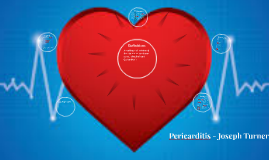Background Life
Transcript: Over-the-counter pain relievers Colchicine (Colcrys). This drug, which reduces inflammation in the body, may be prescribed for acute pericarditis or as a treatment for recurrent symptoms. Corticosteroids. If you don't respond to pain relievers or colchicine or if you have recurrent symptoms of pericarditis, your doctor may prescribe a steroid medication, such as prednisone. www.google.com Infection (viral, bacterial, parasitic, or fungal and, in people with AIDS, tuberculosis, or aspergillosis) Heart attack Heart surgery (postpericardiotomy syndrome) Systemic lupus erythematosus (lupus) Rheumatoid arthritis Kidney failure Chest injury Cancer (such as leukemia, breast or lung cancer, or, in people with AIDS or Kaposi sarcoma) Risk Factors Cause A swelling and irritation of the thin saclike membrane surrounding the heart (pericardium). Definitions Life Expectancy Treatment Preventions Pericarditis - Joseph Turner Risk Factors Strong Factor male gender age 20 to 50 years transmural MI cardiac surgery neoplasm viral and bacterial infections uremia or on dialysis systemic autoimmune disorders Weak Factor pericardial injury mediastinal radiation https://www.ncbi.nlm.nih.gov/pubmedhealth/PMHT0023198/ You usually can't prevent acute pericarditis. You can take steps to reduce your chance of having another acute episode, having complications, or getting chronic pericarditis. These steps include getting prompt treatment, following your treatment plan, and having ongoing medical care (as your doctor advises). https://online.epocrates.com/diseases/24332/Pericarditis/Risk-Factors https://www.merckmanuals.com/home/heart-and-blood-vessel-disorders/pericardial-disease/acute-pericarditis

















